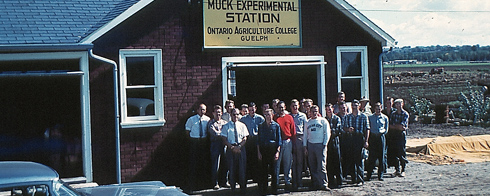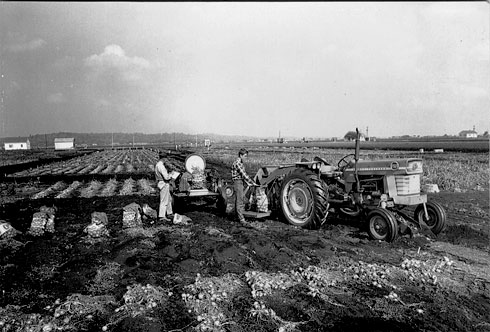Ontario Crops Research Centre – Bradford – 60 Years of Research

The ‘Muck Station’ has been called many things, including the ‘World’s Smallest Research Station’. Over the past 60 plus years, researchers and extension staff at the Station have corresponded and worked with people from around the world.
The Experiment Station for Organic Soils in Holland Marsh, now the Muck Crops Research Station, was established in 1946 as a field station of the Department of Horticulture, University of Guelph. The first crop was harvested in 1947 and a small, wood frame building was built of the 4 hectare triangle of land in 1948. Professor C.C. (Conny) Filman was hired as the manager of the station.
In 1970, the station became part of the Horticultural Research Institute of the Ontario Ministry of Agriculture and Food (OMAF). When Conny Filman passed away in 1973, Matthew Valk was asked to take over as Officer in Charge and Senior Muck Crops Specialist. Matt had been employed as an Extension Horticulturalist with OMAF, and had also worked at the Station as a research assistant from 1952-1954. Edo Knibbe was hired by Matt in 1974 to be the research technician and farm manager.
In the spring of 1989, both Matt and Edo Knibbe retired. By the first of June, Mary Ruth McDonald was hired as the Officer in Charge. Mary Ruth had been working for OMAF at the Muck Station as the Pest Management Specialist since 1983, but first came to the Marsh was as a M.Sc. student, and then as a pest management scout, and supervisor-scout for the muck crops IPM program.
As Matt and Mary Ruth were free to admit, it was the technicians who did the bulk of the work on the research trials. Edo made his mark as a technician at the Station for many years and was followed by Holly Burbidge, who worked as a contract technician from 1983 to 1989. In 1994, Shawn Janse became farm manager and technician. He started his career at the Muck Station as a summer student working for Prof. Vince Machado in 1989. In 1998, following the merger with the University of Guelph, Shawn became Station Manager. In the spring of 2004, the Muck Crops Research Station was moved from the Dept. of Plant Agriculture and came under the wing of the Office of Research.
With the merger with the University of Guelph, Mary Ruth became part of the faculty in the Department of Plant Agriculture. Shawn maintained his interest in research and contacts with the seed industry by taking responsibility for the cultivar trials, but the rest of his time was fully occupied managing the farm and station. Kevin Vander Kooi started at the Muck Station in 1993 as a summer student and was hired as an Ag. Worker in 1996. In 1998, with the University of Guelph merger, he became a full time research technician with Mary Ruth’s research program.
Over the years many other people have worked in different capacities at the Muck Station. In 1983, after a 3 year pilot project, an Integrated Pest Management Program for muck vegetables was introduced to the area, with Mary Ruth as the full time IPM specialist and later Jim Chaput held that position. To house the influx of several summer students working as IPM scouts, a portable was attached to the south east side of the station.
The building was added to and changed several times, and was partially flooded during Hurricane Hazel, Oct. 15, 1954. It was increased in size to provide sleeping quarters for the summer students, and later became a year-round facility. Cold storages were added, including a new ‘Filacel’ storage for high humidity storage of carrots. In the 1960s a greenhouse was added for the study of greenhouse cucumbers and to allow the production of vegetable transplants for trials.
The Muck Station was completely renovated in the fall of 1995 and winter of 1996. The staff at the Station moved across the street and worked out of a rented house while the building was stripped down to the supporting studs, rearranged and rebuilt. Only the cold storage area and greenhouses were left in the same place, but the storages were upgraded and renovated as well.
The Muck Station, with the addition of rented land, continues to be a vibrant center for applied research on muck vegetables. Mary Ruth’s research program, which includes several graduate students, occupies the most space and focuses on crop protection and integrated crop management. Projects involve developing and testing integrated pest management programs, investigating the relationship between crop nutrition and plant disease, biological control, registration of reduced risk materials, and evaluating plant resistance to insects and diseases. Several other researchers from the University of Guelph and the seed industry have trials at the Station, and seed companies continue to support the variety trials. The work is summarized in the Muck Vegetable Cultivar Trial and Research Report, and trials on are display at the Grower Field Day each year.
The Annual Muck Vegetable Growers Conference has been an important event in the yearly cycle of the Marsh since 1951. In 1973, Matt Valk changed it from a half day update to a two day conference, which continues to be well attended to this day. Matt was also editor and major contributor to the Muck Crops Newsletter, which was continued by Mary Ruth until cancelled as a result of the reorganization of extension services by OMAF and the changed emphasis of the Muck Station programs under the University of Guelph.
Mary Ruth McDonald and Matthew Valk
Picture of Onion Variety Trails from the 1970's.
